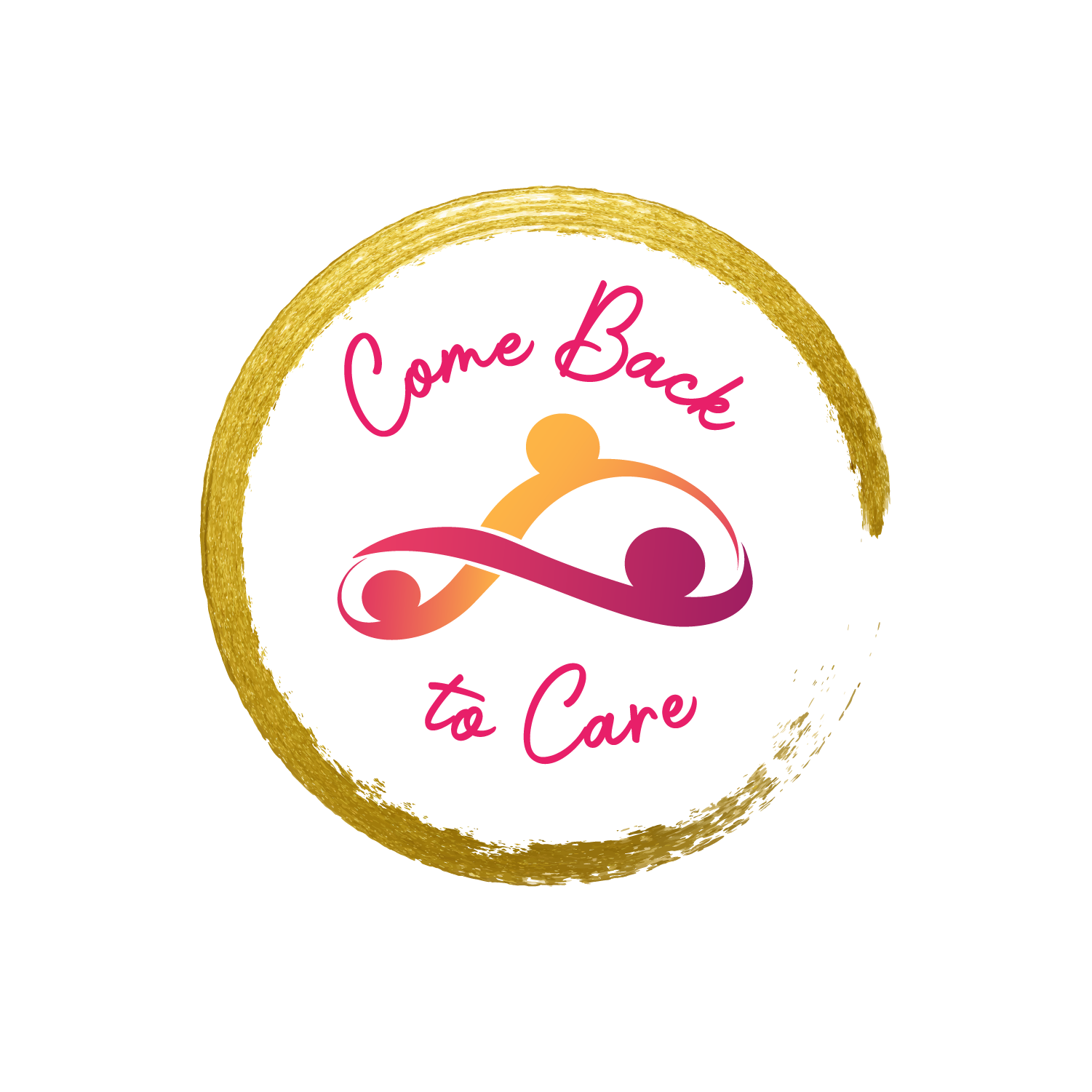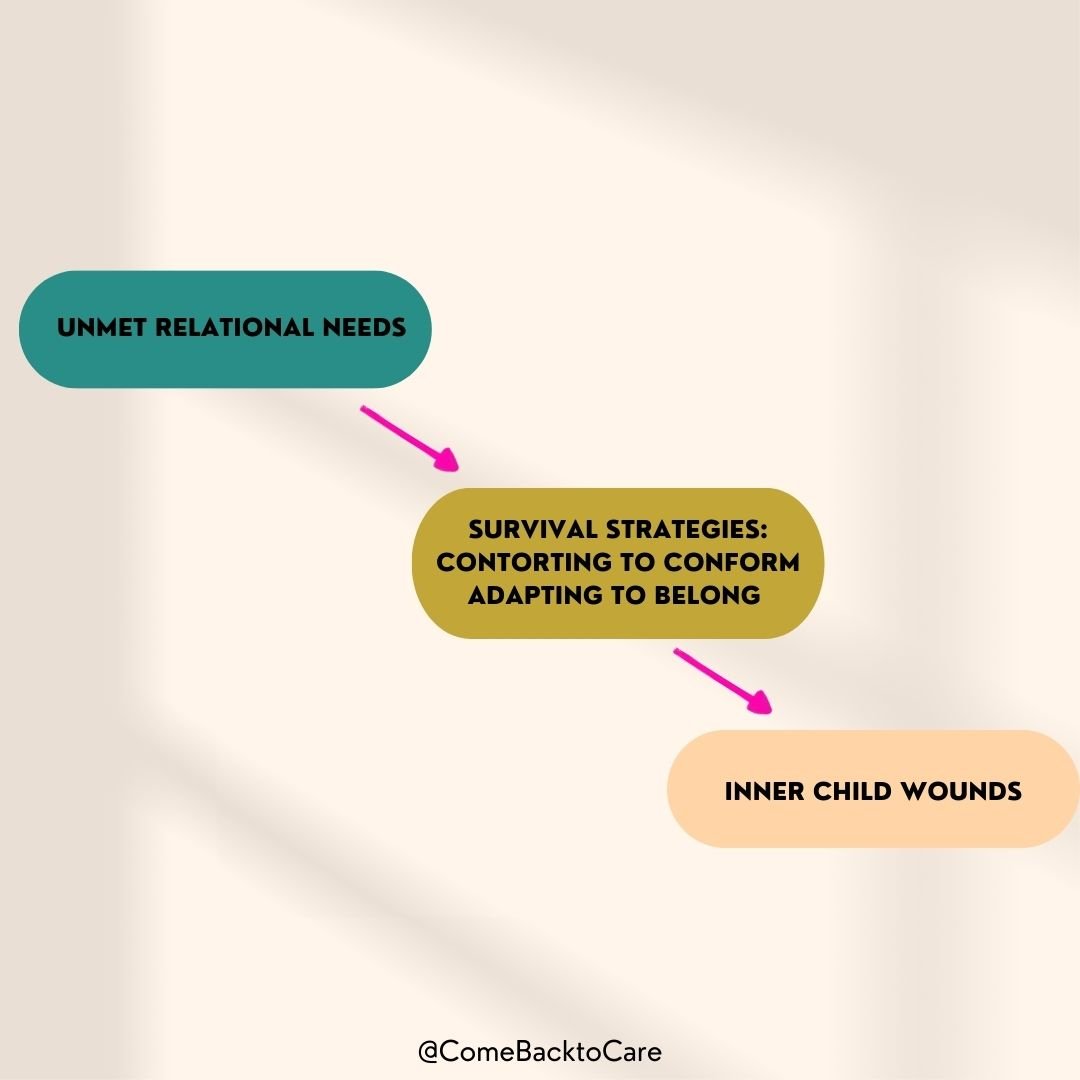What's an Inner Child Wound and Why Re-Parenting Inner Child is Important?
Inner child wounds (or more clinically speaking…intergenerational transmission of attachment) come from what you had to do to be the child your parents wanted you to be. As a child, you unconsciously adapted how you behaved to fit in with your family rules, to blend in and belong. You unconsciously adapted your behaviors to meet your parents’ expectations, to make sure you got their approval, acceptance, and availability so you were taken care of. Or, in child development language, you did what you had to do to make sure your relational needs were met.
Relational needs are a child’s need to:
be seen, heard, loved, and validated. Because being seen, heard, loved, and validated is how you learn that you matter and your needs are real and valid… enough for you to ask for what you need and set boundaries or say no to things you don’t need down the line.
be emotionally held, cued-in, or attuned to. Because that’s how you learn that when you’re smiling, it’s called happy and when you’re crying, it’s called sad…so you can be with your feelings and navigate them which are the foundation for emotional awareness and literacy.
be delighted in. Because it’s how you learn that you have an impact on the world around you. You are real and you can take up space.
As you can see relational needs are as important as physical needs like food and shelter. The types of relational needs that were met or weren’t met in your childhood shape how you interact with others as an adult. They affect how comfortably we can say “no, thank you” to others and set boundaries without having to be afraid that the other person’s going to abandon us. Or how comfortable we are being real, imperfect, and authentic without having to be afraid that the other person’s going to reject us, criticize us, or humiliate us.
When you grew up in an environment where relational needs were conditional, you adapted to those conditions to blend in and belong.
When you contort yourself to conform to your parents’ expectations, you end up leaving the parts of yourself that aren’t accepted in the family behind to avoid experiencing rejection, humiliation, criticism, and abandonment…you abandon those parts of yourself to survive. Contorting your body over and over again to survive by meeting external expectations leaves a wound.
For example, if you grew up in a family that values hard work, you might not be as skilled when it comes to rest, play, or anything quote unquote “unproductive.” To blend in and belong in the family- which for a child is a matter of survival, you had to over-learn productivity and perfectionism and under-learn rest and relaxation.
Identifying inner child wounds doesn’t mean pathologizing your unskillfulness aka your survival strategies. As a child you simply had to over-learn what was valued in the family and under-learn what wasn’t. Similarly, identifying inner child wounds isn’t about shaming your parents or justifying their actions or inaction either.
So that’s what an inner child wound is. Now let’s unpack our next question.
Why is it important to heal inner child wounds or re-parent your inner child?
Re-parenting your inner child means meeting those relational needs that didn’t get met for you as a child.
Re-parenting your inner child is an important milestone in your parental development for two reasons.
First, unhealed inner child wounds often become parenting triggers.
The pain from your past often hijacks your behaviors in the present. You may find yourself reacting to a situation way out of proportion.
When you’re stressed, it’s common to react emotionally and unintentionally revert back to old relationship patterns. These patterns include yelling, shutting down, checking out, people pleasing, being a perfectionist, and blaming others. When these patterns seem to come out of nowhere, it’s so easy to lose the context and label yourself as “too soft,” “not strong enough,” “too pushy,” or “not disciplined enough.” When you forget that these patterns must come from somewhere, you might reduce yourself to these labels. You might blame yourself as a way to motivate yourself to not lose your cool with your child like that again in the future. This cycle of react-revert-reduce often keeps many of us stuck in survival mode or stuck using the same survival strategies we had to over-learn when we were little.
This self-blame can also lead you down a rabbit hole where you find new band-aids, like a new gratitude journal or a new meditation app to help you quote unquote “be more disciplined” aka to cover your unhealed inner child wounds. Instead of covering the wounds, you can heal your inner child wounds underneath those parenting triggers.
And here’s the second reason why healing our inner child wounds is important: unhealed inner child wounds often become barriers to your child’s relational needs.
“It’s really hard to meet your child’s relational needs when your own inner child’s relational needs weren’t met. It’s like you don’t get what you didn’t get.”
To meet your child’s relational needs by attuning to them, you need to know what it feels like to be attuned to. And to hold space for your child to be who they are fully, you need to know what it feels like to take up space without any fear of losing your parents’ approval, acceptance, and availability.
But when your parents’ love was conditional on your performance and productivity, it’s really hard to know what those feelings feel like. Again, it’s hard to meet your child’s relational needs when your own inner child’s relational needs weren’t met.
In parenting, we tend to unconsciously validate, appreciate, and approve of our children’s behaviors when those behaviors closely match those we had to adapt to. For example, if you had to be quiet and invisible as a child to stay physically safe and emotionally seen, you might tend to praise your child when they play quietly and independently. You might also unconsciously discourage them from “being too much” when they’re playful, assertive, or curious.
This process is unconscious and done out of love. I repeat it’s unconscious and done out of love. You love your child and, of course, you want them to adopt the same survival strategies you adapted. This is one reason why an apple doesn’t fall far from the tree.
What’s not transformed gets transmitted. The unhealed wounds and their survival adaptations get passed down across generations.
Preparing and protecting your child makes sense. However, if you’re stuck in survival mode and trying to raise your child when your inner child is triggered, preparing your child to be the same as you isn’t quite the same as being present with who they actually are. When raising your child is preparing them and protecting them to survive 100 percent of the time, your parenting might look like a copy and paste version of your childhood, even though you’re trying to break those family cycles and give your child a different childhood from the one you had.
And I’m not dismissing the real need for us to prepare and protect our children from reality. But the work here is balance.
When you give yourself what you didn’t get or re-parent your inner child, it’s much easier to both-and. It’s much more manageable to have a balance between protecting your child from the pain you experienced growing up and being present with who they are right now.
And when you can’t meet those missing relational needs by yourself, build meaningful relationships with those you trust who can hold space for you to take up, who can witness you and love you when you can’t love yourself, or who can validate your feelings when they feel too silly or too much. We cover this topic in much more depth in episode 23: Three Social Justice Actions to Build Your Parenting Support System.
But the example I’d love to share here is: if being delighted in was conditional based on how many A pluses you got on the school report card, you might fill that gap by delighting in yourself and celebrating your efforts (not outcomes) in finishing half the puzzle or trying out a new recipe and adding new spices to it or doing anything imperfectly for fun. Yes, fun. Or, when celebrating these quote unquote C minus efforts feels like a waste of time, you have a trusting accountability partner who can delight in you…with you.
At the end of the day, re-parenting your inner child is an act of radical self-love. You love all parts of you, including those parts that you had to shame away and hide to blend in and belong. When the fragments of you become whole again, you do the healing work your ancestors couldn’t and model this radical self-love to your child. It’s possible to be the parent you know you can be.
Closing Reflection Questions:
How did you know when your relational needs were met when you were little?
Were love, acceptance, and approval conditional on performance and productivity?
If so, how is that shaping the ways you form meaningful relationships with your adult friends and partners?

